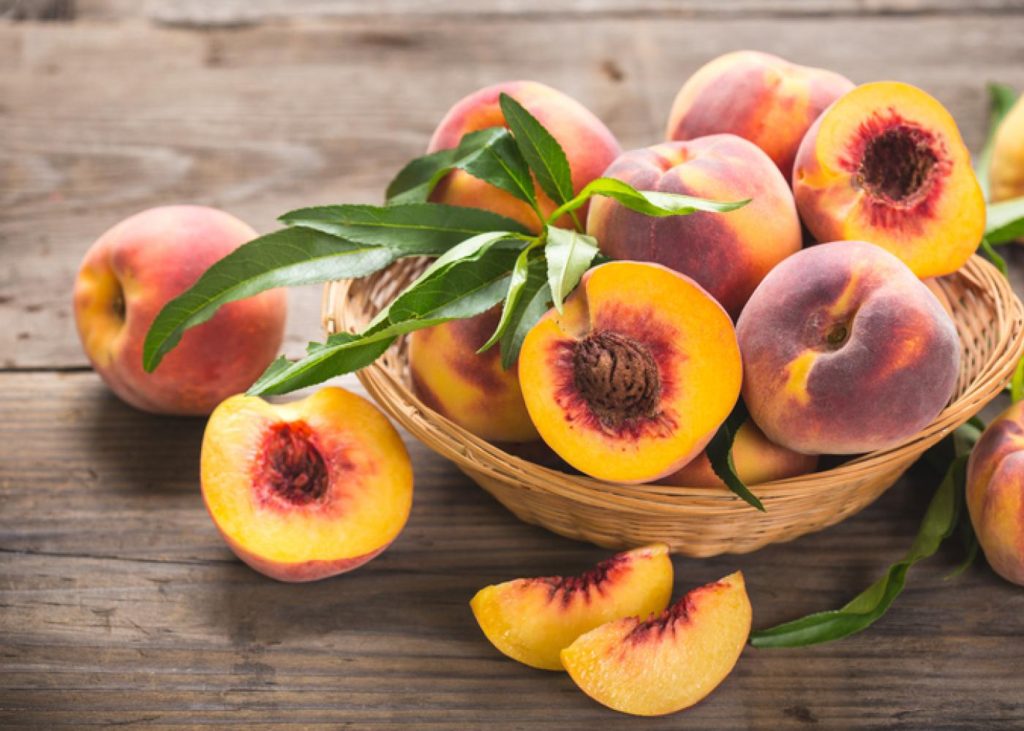Peach Health Benefits and Nutrition
Many people love the flavor and smell of peaches, and enjoy the versatility of using peaches in desserts, salsas, and beverages. The nutrition in peaches is excellent and they also have great health benefits. Peaches are stone fruits, meaning they have a large seed (or pit) in the center. Stone fruits are typically filled with nutrition and the peach definitely falls into that category.
Vitamins and Benefits of Peaches
Peaches are rich in Vitamin C, which is well known to boost the immune system and protects against heart disease. They also are a good source of Vitamin A, a vitamin that plays a role in vision, immune function, embryonic development and reproduction, bone metabolism, skin health, and can help fight cancer.

Vitamins B1, B2 along with Vitamin A help maintain the the nervous system, magnesium levels in the body, help synthesize hemoglobin, and also strengthen the immune system. In addition, the antioxidants in peaches slow cell damage by free radicals.
One peach contains about 2.5g of fiber, 16g of carbohydrates, almost no fat, and 1.5g of protein all packed into only 66 calories. The fiber helps prevent several diseases and can help you lose weight. Peaches are known to lower the cholesterol level in the blood which prevents cardiovascular diseases, anemia and renal diseases and can destroy extra fat layers. As a result, peaches can even help you lose weight.
The iron content of a peach is good for those with anemia, including some pregnant women. The potassium in a peach is good for cardiac health and lower your blood pressure. Finally, peaches act as a gentle laxative and can flush out the toxins from the bladder and kidneys and relieve constipation.
As with many fruits, most of the vitamins and minerals are contained in the peach skin. If you don’t care to eat the fuzzy skin, you may want to try the nectarine, a cousin fruit to the peach, which has a smoother skin.
As you might expect, all the above benefits are most realized when eating fresh peaches. Canned or dried peaches lose some vitamin content and peaches canned in syrup will likely have higher sugar and calorie content.
When eating a fresh peach, definitely avoid the pit. Peach pits contain hydrocyanic acid (or cyanide) which is a toxic substance, and ingestion of large quantities can be fatal. Buy and eat your peaches fresh during peak peach season (May to October), avoid the pit, and enjoy the many health benefits of this wonderful fruit.
Peach Nutrition Facts
| Serving Size: 1 peach (170g) | |||
| Amount per Serving | |||
| |||
| % Daily Value * | |||
| Total Fat 0.42g | 1% | ||
| Saturated Fat 0g | 0% | ||
| Cholesterol 0mg | 0% | ||
| Sodium 0mg | 0% | ||
| Potassium 323mg | 9% | ||
| Total Carbohydrate 16.22g | 5% | ||
| Dietary Fiber 2.6g | 10% | ||
| Sugars 14.26g | |||
| Protein 1.55g | 3% | ||
| Vitamin A | 11% |
| Vitamin C | 19% |
| Calcium | 1% |
| Iron | 2% |
| Vitamin E | 4% |
| Vitamin K | 6% |
| Thiamin (B1) | 3% |
| Riboflavin (B2) | 3% |
| Niacin (B3) | 7% |
| Folic Acid (Folate) | 2% |
| Magnesium | 2% |
| Panthothenic Acid | 3% |
Estimated Percent of Calories from:
| Fat 5.7% |
| Carbs 98.3% |
| Protein 9.4% |
